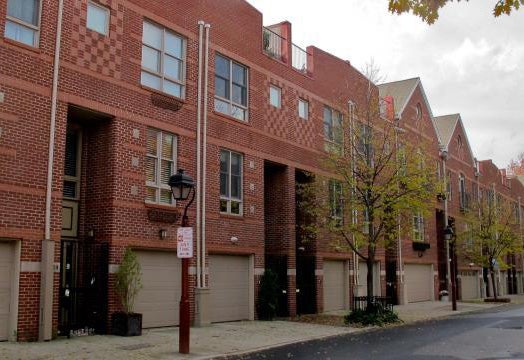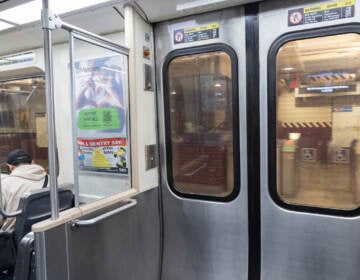City Council tweaks bill requiring developers to provide more parking in Philly neighborhoods
The new version of the bill calls for smaller increases in parking requirements that are more likely to be signed into law than those in the measure’s predecessors.

Newer homes with garages.(Ashley Hahn/PlanPhilly)
A measure that would require developers to build more parking along with new housing got a major haircut in City Council on Wednesday.
The mandatory parking minimum bill revised by the council’s Rules Committee bears little resemblance to the far more significant reform proposed in Councilwoman Jannie Blackwell’s original bill. Instead, the new, scaled-back version calls for smaller increases in parking requirements that are far more likely to be signed into law than those contained in the measure’s more radical predecessors.
Councilman William Greenlee, chairman of the Rules Committee, made it clear that though the measure was being put on hold until June 12, he along with other supporters of the measure were committed to seeing something pass this session — that is, by the end of June.
“Is it safe to say this is a compromise from the original [Blackwell] bill?” asked Greenlee, who supports higher parking minimums. “I really wish there had been some more mandated parking in my neighborhood. No matter what some people may think, people own cars.”
In Blackwell’s original bill, developers building more than four units of housing in areas zoned for rowhouse development would have to provide three parking spaces for every ten units of housing. That has been scaled back in the amended version, so that three spaces per ten units would only be required for developers building over ten homes in rowhouse areas. That’s still a lot more than they are required to build now, however: No new parking is required under current regulations.
Even many opponents of increased mandatory minimums say that requiring a degree of parking in those areas makes sense, at least from a political perspective.
Most experts, and many interest groups, oppose mandatory parking minimums. But neighborhood groups that serve as a reliable power base for district council members are likely to look on them favorably. Because they represent working-class rowhouse neighborhoods seeing an influx of development, Blackwell and Council President Darrell Clarke have been eager to see legislation of this nature pass. After decades of population decline in their districts, some of their longtime constituents suddenly have to compete for parking with newcomers.
The downside of parking minimums is less likely to influence politicians who persistently hear from annoyed longtime residents. Forcing developers to build parking along with large-scale new rowhouse projects — which has not been required since the city’s the 2012 zoning reform — might drive up the cost of some new construction, but that is unlikely to bother current residents.
Still, opponents of Blackwell’s legislation did not just include developers. A representative of the Crosstown Coalition, an umbrella organization for many of the better-funded and better-organized community groups, spoke passionately against the bill. (A poll of the group’s members found more than 20 opposed to the idea and only one in favor.) Environmental advocates and affordable-housing activists also spoke against Blackwell’s initiative.
“Increasing parking requirements for residential development will reduce the amount of affordable housing we can build,” said Garrett O’Dwyer, policy associate with the Philadelphia Association of Community Development Corporations. “How could we ask someone to spend another night in a shelter so someone else can find a space?”
The new text of the bill mostly went unaddressed because few of the interest groups had seen it yet. But the differences are marked. Beyond the new proposals for rowhouse developments, the amended bill would leave the parking requirements for the city’s densest zoning categories as they are now: three for every 10 units.
Blackwell’s bill would have doubled the number of mandated parking spaces in those areas, largely focused in Center City and University City. That provision was one of the more unpopular, and confusing, aspects of the original bill because those zoning categories are typically in parts of the city that are extremely walkable and near transit.
But other aspects of Blackwell’s bill have been toned down, but not eliminated. Some of those tweaks are still expected to generate pushback, especially because they affect higher-density zoning districts that typically are not in the midst of the rowhouse neighborhoods that engendered the parking backlash.
Blackwell’s original legislation would have forced builders in residential-industrial areas, such as Callowhill and parts of Kensington, to build seven parking spaces for every 10 housing units, which would have been the highest parking requirement in the code. In the revised legislation, that number was decreased to five spaces for every 10 units.
Similarly, developers building more than 10 units in the zoning district that allows small- to medium-scale apartment buildings would be required to build five parking spaces instead of three. The zoning category covering commercial corridors, where ground-floor retail with apartments above are encouraged, would be required to build three spaces for 10 units. Currently, such projects do not need to provide parking.
The bill also would double parking requirements for apartment zoning categories in such areas as Roxborough, Germantown, and the Far Northeast. But developers in those areas, many of which are not walkable or have scant transit access, likely are already providing greater parking.
The academic research on mandatory parking minimums finds that it increases the price of housing, pushing developers towards the luxury market and costs onto those who do not own cars. (Thirty-one percent of Philadelphia households do not own vehicles.) Affordable-housing groups have long opposed such requirements, noting that they necessitate even deeper subsidies in a political context where government supports are scarce.
Most expert observers agree that a better way to tackle the issue would be to price on-street parking according to demand. Currently, many neighborhoods allow free on-street parking, but even where permit zones are in place the Philadelphia Parking Authority’s rates are relatively low — just $35 per year for a parking permit.
“So that’s about 10 cents a day for a parking permit,” said Councilman Allan Domb. “When is the last time that was raised?”
A study shows that the price Domb cited does not accurately reflect the high value residents of many city neighborhoods place on parking spaces. Research from Drexel University’s Kevin Gillen found that residents of rowhouse neighborhoods like those represented by Blackwell and Clarke placed the highest monetary value on parking (in terms of the percentage of the home’s total value).
Many residents of such neighborhoods spoke in favor of the bill, citing an inability to park in front of their own homes. But opponents offered broader concerns.
Bill opponent Chloe Finigan, of the Clean Air Council, noted that research by Econsult Solutions has found that renters and apartment dwellers are less likely to own cars. The costs of the bill would be borne by those residents, she argued.
“This is a regressive policy change that prioritizes parking over environmental health, affordable housing, and transit-oriented development,” said Finigan. “We need to craft policy for people, not cars.”
Councilman Greenlee did not see the merit in her argument.
“In a perfect world, I’d like to see a whole lot less cars, but in reality I see a whole lot of cars in these areas,” he said. “I hear the numbers, but my eyes say something else.”
WHYY is your source for fact-based, in-depth journalism and information. As a nonprofit organization, we rely on financial support from readers like you. Please give today.







